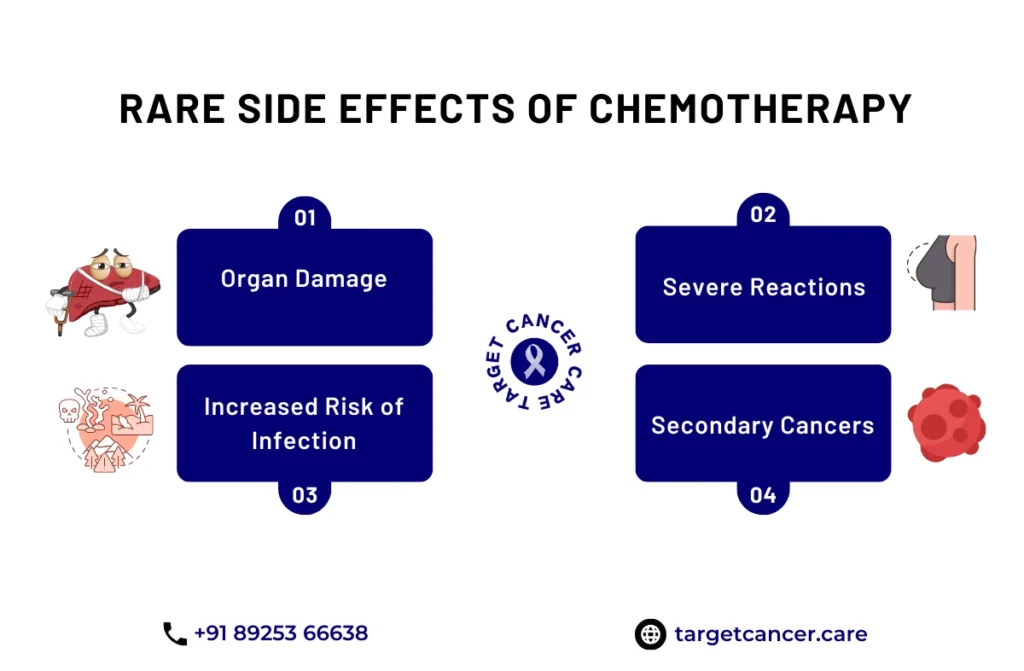Chemotherapy is one of the most common treatments for cancer, but its effects of chemo on the body can be overwhelming. Understanding how chemotherapy affects the body helps you better prepare for the treatment journey. From the circulatory system to mental health, chemotherapy can have a wide range of impacts.
What is Chemotherapy?
Chemotherapy refers to a type of cancer treatment that uses powerful drugs to destroy cancer cells. These drugs target rapidly dividing cells, which is why they work well on cancer cells, but unfortunately, they also affect other fast-growing healthy cells in the body. So, how long chemo stay in body The drugs are typically in the body for hours or even days, and understanding this can help you be better prepared for the effects during and after treatment.
- Chemotherapy drugs travel through the bloodstream to target cancerous cells, but they don’t differentiate between healthy and cancer cells.
- These treatments are often administered in cycles, with breaks in between to allow the body time to recover.
By understanding how chemotherapy works and how long chemo stays in your body, patients can better plan for their recovery and know what to expect from the treatment.
Effects of Chemo on the Body
Chemotherapy is a systemic treatment that targets rapidly dividing cells. While it plays a crucial role in cancer management, it affects both malignant and healthy cells, leading to widespread physiological effects. The effects of chemo on the body vary based on drug type, dosage, and individual health.
Circulatory and Immune Systems
Effects of chemo on the body often start with the circulatory and immune systems, as chemotherapy targets rapidly dividing cells, including blood-forming cells in the bone marrow.
- Blood Cell Disruption: Red blood cell production may drop, causing anemia, which leads to fatigue and weakness. White blood cell count can also fall, increasing the risk of infections.
- Platelet Suppression: Chemotherapy can decrease platelet counts, leading to easy bruising, prolonged bleeding, and gum or nosebleeds.
- Weakened Immunity: The immune system becomes compromised, making it difficult to fight common infections. This effect can last for weeks or even months after treatment.
Nervous and Muscular Systems
The nervous and muscular systems are susceptible to the neurotoxic effects of certain chemotherapy drugs.
- Peripheral Neuropathy: A common side effect, characterized by numbness, tingling, or burning sensations, often in the hands and feet. This can affect coordination and balance.
- Muscle Weakness: Some patients experience muscle cramps or general muscle weakness, making physical activity challenging.
- Cognitive Changes: Often referred to as “chemo brain,” patients may struggle with memory, concentration, or multitasking.
Digestive System
The effects of chemotherapy on body functions include significant impacts on digestion and nutrient absorption.
- Nausea and Vomiting: These are among the most common side effects and can range from mild to severe, depending on the drug regimen.
- Mouth Sores and Dryness: Chemotherapy can inflame the mucous membranes, causing painful sores and difficulty in eating or speaking.
- Loss of Appetite and Taste Changes: Patients might find food unappealing or experience metallic or bitter tastes, leading to weight loss and malnutrition.
- Diarrhea or Constipation: Gastrointestinal disruptions are common and vary by drug type and patient response.
Integumentary System (Skin, Hair, Nails)
- Hair Loss (Alopecia): One of the most visible effects of chemo on the body is hair loss, which may occur on the scalp, eyebrows, eyelashes, and body.
- Skin Irritation: Skin may become dry, flaky, or more sensitive to sunlight. Some patients experience rashes or darkening of the skin.
- Nail Changes: Nails may become brittle, discolored, or develop ridges. In severe cases, they may lift from the nail bed or fall off.
Sexual and Reproductive Systems
- Hormonal Disruptions: Chemotherapy can affect hormone levels, leading to irregular or stopped menstrual cycles in women, and reduced testosterone in men.
- Infertility Risks: Depending on age and the type of drug, temporary or permanent infertility is a potential risk.
- Reduced Libido: Fatigue, hormonal changes, and emotional distress can reduce sexual desire and satisfaction.
- Impact on Bladder Cancer Patients: In cases like bladder cancer, chemotherapy can affect urinary and reproductive organs, contributing to discomfort during urination and sexual dysfunction. This adds to the broader question of how does bladder cancer affect the body beyond just tumor growth.
Excretory System
- Kidney Function Strain: Chemotherapy drugs are filtered through the kidneys, potentially causing damage or reducing kidney function over time.
- Bladder Irritation: Certain chemo agents can inflame the bladder lining, causing pain and increased urgency. This directly relates to how does bladder cancer affect the body, especially when treatments are delivered intravesically.
- Hydration Is Crucial: Increased fluid intake is often recommended to help flush out toxins and reduce the strain on the excretory system.

Skeletal System
Though less immediate, the effects of chemo on the body can indirectly affect bones and joints.
- Bone Density Loss: Hormonal changes caused by chemotherapy may accelerate bone loss, increasing the risk of osteoporosis, especially in postmenopausal women.
- Joint Pain and Stiffness: Some drugs can cause inflammation in the joints, leading to discomfort that mimics arthritis-like symptoms.
Mental Health
Mental health often takes a significant toll due to both physical side effects and emotional challenges.
- Depression and Anxiety: Patients may struggle with feelings of sadness, hopelessness, or persistent worry. This is a direct effect of chemo on the body as it disrupts brain chemistry and personal identity.
- Sleep Disturbances: Insomnia or disrupted sleep patterns can arise from both emotional stress and physical discomfort.
- Cognitive Decline: Mental fog, reduced processing speed, and memory issues are frequently reported, affecting daily activities and decision-making.
How Long is Chemotherapy Treatment?
The duration of chemotherapy treatment varies based on cancer type, regimen, and the patient’s condition. Chemotherapy typically lasts from several weeks to months. However, how long chemo stay in body can differ, as some drugs may stay in the system for days or weeks, with side effects potentially lasting longer.
- On average, chemotherapy treatment sessions last between 30 minutes to a few hours, depending on the drug being administered.
- Chemotherapy is often broken into cycles, with each cycle lasting a few weeks. Treatment may involve multiple cycles depending on the cancer type and stage.
Knowing how long chemo stay in body is essential because side effects may linger for some time after treatment ends. While some drugs leave the body quickly, others can take longer to be eliminated.
Types of Chemotherapy
Chemotherapy isn’t a one-size-fits-all treatment. Different drugs and delivery methods are used depending on the type of cancer and the patient’s overall health. Here’s a breakdown of the main types:
- Intravenous (IV) Chemotherapy: The most common type, where drugs are administered through a vein directly into the bloodstream.
- Oral Chemotherapy: Pills or capsules taken by mouth, allowing for home-based treatment in some cases.
- Injected Chemotherapy: Administered via a shot in a muscle or under the skin.
- Topical Chemotherapy: Applied as a cream or gel for skin cancers.
- Intra-arterial (IA) and Intraperitoneal (IP) Chemotherapy: Delivered directly to the tumor site for localized treatment.
Each type of chemotherapy has different absorption and elimination times, which directly impacts how long chemo stays in your body.
How Long Chemo Stay in Body?
Most chemotherapy drugs are metabolized and eliminated from the body through the liver and kidneys within 24 to 72 hours after treatment. However, traces can linger longer in various tissues, including hair follicles, nails, and organs.
Key factors that determine how long chemo stays in your body include:
- Type of drug used
- Dosage and frequency
- Individual metabolism rate
- Kidney and liver function
- Hydration and nutrition levels
Even though the drug itself may leave the bloodstream relatively quickly, the effects can last for weeks or months due to cellular damage, especially to fast-growing cells. That’s why patients may continue to feel fatigue, nausea, or other symptoms well after treatment has ended.
What Are the Side Effects of Chemotherapy?
Chemotherapy doesn’t just attack cancer cells; it also affects healthy cells, especially those that divide quickly. This can lead to a wide range of side effects, some short-term and others long-lasting:
- Fatigue: Often the most common side effect, lasting for weeks or even months post-treatment.
- Nausea and Vomiting: Caused by certain chemo drugs and typically managed with anti-nausea medications.
- Hair Loss: Temporary, as hair usually begins to regrow a few weeks after treatment.
- Increased Risk of Infections: Due to reduced white blood cell count.
- Anemia and Bleeding: Caused by low red blood cell and platelet counts.
- Neuropathy (Nerve Damage): Tingling, numbness, or pain in hands and feet that can last long after chemo ends.
- Cognitive Issues (“Chemo Brain”): Problems with memory and concentration that may persist for months.
The presence of these symptoms often leads patients to wonder how long chemo stays in your body, since side effects can feel like they linger far beyond the actual treatment period.
Rare Side Effects
While most chemotherapy side effects are well-documented, some patients may experience rare, unexpected reactions. These complications depend on drug type, duration, and personal health factors.
- Cardiac Toxicity: Certain chemotherapy drugs like doxorubicin can damage the heart muscle, resulting in arrhythmias or reduced heart function. This may present as shortness of breath or chest discomfort, especially during physical activity.
- Hearing Damage: Cisplatin and related drugs may affect the inner ear, causing tinnitus or irreversible hearing loss. Children and the elderly are more susceptible to this rare complication.
- Lung Inflammation: A few chemotherapeutic agents may lead to pulmonary fibrosis or interstitial lung disease, manifesting as chronic cough and difficulty breathing.
- Nephrotoxicity: Damage to kidney tissues can cause electrolyte imbalance, reduced urine output, and high creatinine levels. This is especially relevant for those with bladder cancer, as both the disease and treatment strain the urinary tract.
- Secondary Cancers: Chemotherapy can, in rare cases, increase the risk of future cancers, such as leukemia, due to DNA damage in healthy bone marrow cells.
These rare outcomes highlight why the effects of chemo on the body must be closely monitored throughout treatment, with pre-treatment screenings and regular follow-ups being essential.
Risks
Understanding the risks associated with chemotherapy allows patients to make informed decisions and take preventive measures during treatment.
- Immune Suppression: A lowered white blood cell count increases susceptibility to infections. Simple colds may escalate into life-threatening conditions due to a compromised immune system. Neutropenic precautions are often necessary during these periods.
- Organ Damage: Long-term use of chemotherapy may lead to liver toxicity, kidney dysfunction, or heart damage. These effects vary based on the regimen and require regular organ function monitoring.
- Infertility: Chemotherapy can permanently affect reproductive organs in both men and women. For younger patients, the option of preserving fertility before treatment should be discussed with an oncologist.
- Cognitive Impairment: Known as “chemo brain,” patients may suffer from attention deficits, memory loss, and slower information processing, which can persist even after chemotherapy ends.
- How does chemotherapy affect the body long-term? It may result in persistent fatigue, chronic neuropathy, or even the development of other diseases such as osteoporosis or hormonal imbalances.
- How does bladder cancer affect the body when treated with chemo? It may exacerbate bladder irritation and lead to long-term urinary complications, such as incontinence or recurrent infections.
Risk management requires regular medical supervision and proactive symptom reporting.
How to Prepare
Proper preparation can significantly reduce the impact of chemotherapy and improve both short-term and long-term outcomes. Both physical and emotional readiness are essential.
- Medical Baseline Assessments: Doctors will usually order a range of diagnostic tests—complete blood count, liver and kidney function, and heart evaluations—to ensure your body is ready for treatment. Any pre-existing conditions are addressed beforehand.
- Dental and Infection Screenings: Existing dental infections or gum diseases can worsen during chemo, so a dental checkup is often required. Vaccinations may also be updated prior to immunosuppression.
- Nutritional Support: Building up the body’s reserves through a balanced, protein-rich diet helps maintain strength. Drinking plenty of fluids helps kidneys process and eliminate chemo drugs more efficiently.
- Emotional Preparedness: Chemotherapy is mentally taxing. Patients are advised to seek counseling or connect with support groups. A realistic understanding of side effects helps reduce anxiety.
- Fertility Planning: Options such as sperm banking or egg freezing should be considered before treatment begins.
- How long does chemo stay in body? Generally, drugs may linger for a few days, but their impact can continue for weeks or months due to cellular-level changes.
Preparation is vital for managing the effects of chemotherapy on body systems and maintaining quality of life during treatment.
Does Chemotherapy Come Out in Sweat?
A question often asked by patients undergoing chemotherapy is, does chemotherapy come out in sweat? The answer is yes—chemotherapy drugs can be excreted through sweat, which means it’s important to take precautions to minimize exposure to others.
- Although the amount of chemotherapy in sweat is generally low, it is still a good idea to take care when handling clothes, towels, or other items that might be contaminated with chemotherapy drugs.
- To avoid potential exposure, patients are often advised to wash their clothes thoroughly and to use gloves if handling items that have come into contact with sweat.
Understanding how chemotherapy works and how long chemo stays in your body helps patients take necessary precautions during treatment and recovery.
Are There Any Natural Remedies That Can Be Used to ‘Detox’ from Chemotherapy?
While the body has its own mechanisms for eliminating chemotherapy drugs, many patients are curious about how long chemo stays in your body and whether there are natural remedies to help “detox” from chemotherapy. Although there is no scientific evidence to support the idea of completely “detoxing” the body from chemotherapy, there are certain lifestyle practices that can help support the body’s natural detoxification processes.
- Staying hydrated by drinking plenty of water can help flush out toxins more effectively.
- A healthy diet full of fresh fruits, vegetables, and antioxidants can support immune function and overall recovery during chemotherapy.
If you’re wondering how long chemo stays in your body, supporting the body’s natural detoxification process through hydration and a healthy diet can be beneficial, but always check with your healthcare provider before trying any new remedies.
Conclusion
Understanding the effects of chemo on the body helps you prepare for what lies ahead during cancer treatment. Whether you are undergoing chemotherapy for breast cancer, lung cancer, or any other target cancer type, the side effects can vary but are manageable with the right preparation. If you have questions or need guidance, reach out to your healthcare provider or a support team for more details. Your health is our priority!




